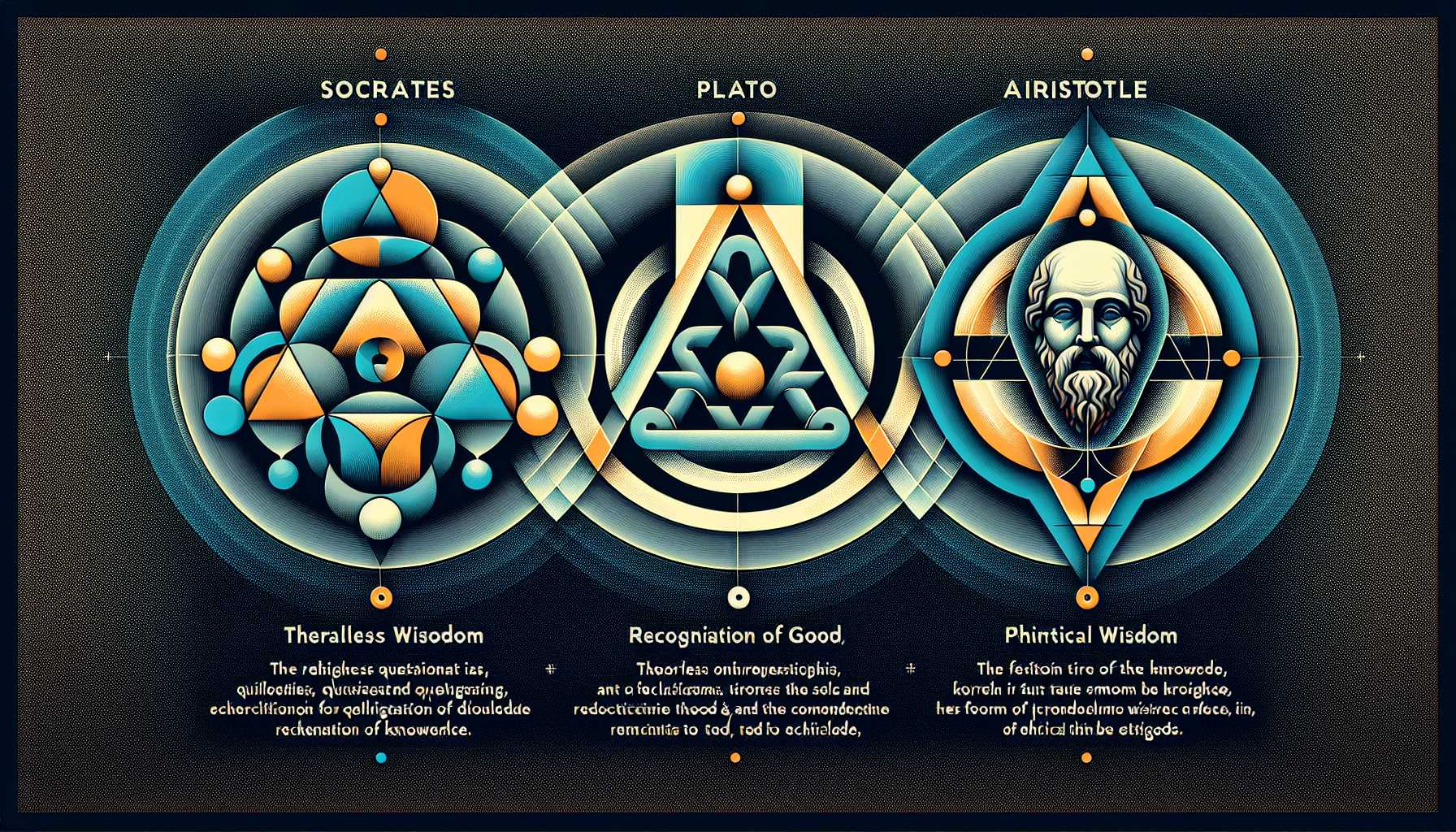
Wisdom Through the Ages Socrates Plato and Aristotles Insights
The article from the Wisdom Center at the University of Chicago discusses the perspectives of three foundational philosophers — Socrates, Plato, and Aristotle — on the concept of wisdom.
Zhījiāgē dàxué de zhìhuì zhōngxīn de wénzhāng tǎolùnle sān wèi jīchǔ zhéxuéjiā — Sūgélādǐ, Bólātú hé Yàlǐshìduōdé — guānyú zhìhuì de guānniàn.
芝加哥哥大学的智慧中心的文章讨论了三位基础哲学家——苏格拉底、柏拉图和亚里士多德——关于智慧的观念。
Socrates is characterized by his approach of relentless questioning and dialogue, emphasizing that true wisdom involves recognizing one’s own ignorance.
Sūgélādǐ de tèdiǎn shì tā bùxiè tíwèn hé duìhuà de fāngfǎ, qiángdiào zhēnzhèng de zhìhuì zàiyú rènshidào zìjǐ de wúzhī.
苏格拉底的特点是他不懈提问和对话的方法,强调真正的智慧在于认识到自己的无知。
He viewed wisdom as a moral quality, deeply linked to how one lives and interacts with others, famously stating that 'the unexamined life is not worth living.'
Tā jiāng zhìhuì shìwéi yī zhǒng dàodé pǐnzhì, yǔ yīgè rén de shēnghuó fāngshì hé yǔ tārén de hùdòng mìqiè xiāngguān, zhùmíng de shēngmíng 'wèi bèi shěnshì de shēnghuó bù zhídé guò.'
他将智慧视为一种道德品质,与一个人的生活方式和与他人的互动密切相关,著名地声明'未被审视的生活不值得过。'
Plato, a student of Socrates, elaborates on the notion of wisdom in his works, especially in 'The Republic,' where he describes the philosopher-king as the ideal ruler.
Bólātú, Sūgélādǐ de xuéshēng, zài tā de zuòpǐn zhōng xiángxì chǎnshùle zhìhuì de gàiniàn, tèbié shì zài 'Lǐxiǎngguó' zhōng, tā jiāng zhéxuéjiā guówáng miáoshù wéi lǐxiǎng de tǒngzhìzhě.
柏拉图,苏格拉底的学生,在他的作品中详细阐述了智慧的概念,特别是在《理想国》中,他将哲学家国王描述为理想的统治者。
For Plato, wisdom is an understanding of the Forms, particularly the Form of the Good, and is essential for achieving justice and knowledge.
Duìyú Bólātú lái shuō, zhìhuì shì duì lǐniàn de lǐjiě, tèbié shì shàn de lǐniàn, bìngqiě duìyú shíxiàn zhèngyì hé zhīshì zhìguān zhòngyào.
对于柏拉图来说,智慧是对理念的理解,特别是善的理念,并且对于实现正义和知识至关重要。
He believed that wisdom has a rational foundation and is connected to a higher truth that transcends the material world.
Tā rènwéi zhìhuì yǒu lǐxìng de jīchǔ, bìng yǔ chāoyuè wùzhí shìjiè de gèng gāojí zhēnlǐ xiānglián.
他认为智慧有理性的基础,并与超越物质世界的更高级真理相连。
Aristotle, Plato's student, provides a more practical view of wisdom, classifying it into two types: theoretical wisdom (sophia) and practical wisdom (phronesis).
Yàlǐshìduōdé, Bólātú de xuéshēng, tígōngle gèng shíjì de zhìhuì guāndiǎn, bǎ tā fēnwéi liǎng zhǒng lèixíng: lǐlùn zhìhuì (sophia) hé shíjiàn zhìhuì (phronesis).
亚里士多德,柏拉图的学生,提供了更实际的智慧观点,把它分为两种类型:理论智慧(sophia)和实践智慧(phronesis)。
He emphasizes that wisdom is not just about knowledge, but also about the ability to apply knowledge in practical situations.
Tā qiángdiào zhìhuì bù jǐnjǐn shì zhīshì, hái bāokuò zài shíjì qíngkuàng xià yùnyòng zhīshì de nénglì.
他强调智慧不仅仅是知识,还包括在实际情况下运用知识的能力。
Aristotle sees wisdom as a virtue, closely tied to ethical behavior, suggesting that a wise person is one who makes sound judgments and decisions that lead to a good life.
Yàlǐshìduōdé jiāng zhìhuì shìwéi yī zhǒng měidé, jǐnmì liánxì dào lúnlǐ xíngwéi, ànshì yīgè cōngmíng de rén shì zuòchū hélǐ pàn duàn hé juécè de rén, dǎozhì měihǎo de shēnghuó.
亚里士多德将智慧视为一种美德,紧密联系到伦理行为,暗示一个聪明的人是作出合理判断和决策的人,导致美好的生活。
Consequently, each philosopher offers unique insights into the nature of wisdom, reflecting their larger philosophical schools of thought.
Yīncǐ, měi wèi zhéxuéjiā dōu tígōngle duì zhìhuì běnzhì de dútè dòngjiàn, fǎnyìngle tāmen gèng dà de zhéxué sīxiǎng liúpài.
因此,每位哲学家都提供了对智慧本质的独特洞见,反映了他们更大的哲学思想流派。
Based on this article
